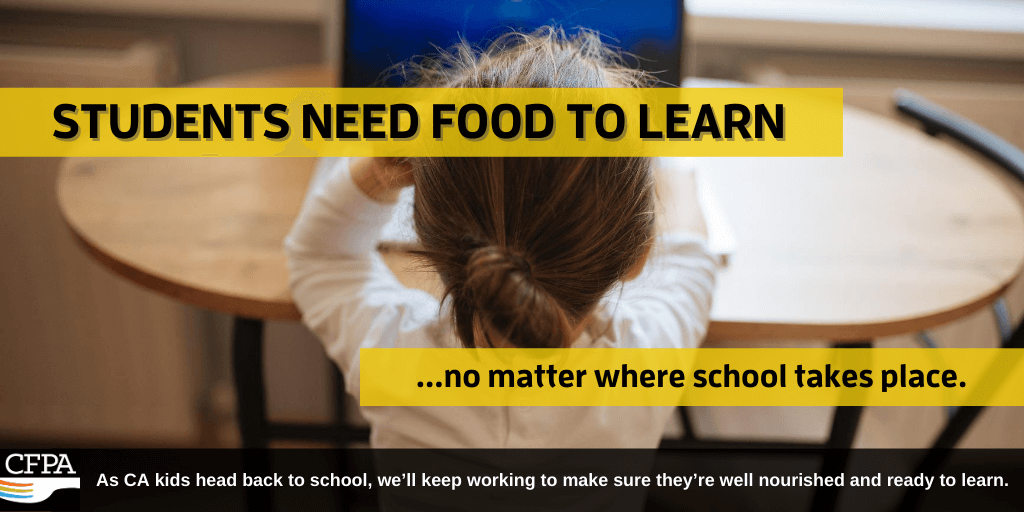Children across California are heading back to school, but not back to their classrooms as usual. From distance learning to alarming rates of economic hardship, students and their families face a daunting school year. The challenges—and the unknowns—are many.
But some things are clear.
- All children should have the nutritious food they need to learn, grow, and thrive at their full potential
- California state law guarantees that K-12 students with low-income will have access to some school meals, whether enrolled in distance or in-person learning.
- Federal administrators are keeping school meal programs from reaching as many children as possible. Read our statement…
- Federal legislators are failing to extend, expand, and strengthen two critical, proven solutions: P-EBT and SNAP.
Childhood hunger is unacceptable. Join us in telling federal leaders they must act!

Uphold Guaranteed Access to School Meals
As schools and parents grapple with how to best care for children in these uncertain times, some constants do remain. For instance, California state law requires that students with low income have access to at least one free or reduced-price meal each school day, whether that school day occurs via distance or in-person learning.
What remains to be seen? How public schools, including charter schools, uphold the spirit and the letter of these laws. Stay tuned for more.
Authorize School Meal Waivers
When COVID-19 forced widespread campus closures last spring, schools worked tirelessly to safely provide free meals, not just to their enrolled students, but to all children in need. This access and flexibility hinged on a series of waivers authorized by federal administrators at the US Department of Agriculture (USDA). Now, despite calls to action from advocates, U.S. Senators, and members of Congress, including CA representatives, USDA has refused to authorize much-needed waivers for the 2020-21 academic year.
As experience from the past school year shows, despite tremendous effort — and even with federal waivers available — school meal programs can only reach a fraction of the students they would normally serve under pre-COVID conditions. Now, with waivers expiring, access and participation will plummet. Failing to extend waivers puts vulnerable children at even greater risk of hunger and food insecurity as they head back to school.
Extend & Expand Pandemic EBT
Late last month, more than 1 in 4 California adults living with children resided in households struggling to afford enough food. Rates of hardship are even worse among California’s chronically under-resourced and disenfranchised communities. Late last month, across our state, more than 1 in 3 Black and Latinx adults living with children resided in households experiencing food insecurity. Historical injustices persist, putting Black and Latinx families at greater risk of harm from COVID-19 and its economic fallout. In the face of tremendous hardship, no single approach is enough to prevent childhood hunger in California.
One part of the solution is Pandemic EBT (P-EBT). Thus far, the program has made an estimated $1.3 billion in food benefits available to more than 3.5 million children throughout California. Those benefits are a lifeline for children at risk of food insecurity. Without an extension and expansion of the program, P-EBT will be a one-time benefit that fails to address child hunger during this global pandemic.
Boost SNAP Benefits
What else is needed to address childhood hunger in the shadow of COVID-19? A 15 percent boost to SNAP benefits (known as CalFresh in California). School nutrition programs and SNAP are meant to work in tandem: children who are eligible for SNAP are categorically eligible to receive free school meals. An increase in SNAP benefits will help families nourish their children as they navigate the countless challenges COVID-19 is throwing our way.
Take Action
The children of California are counting on Congress to pass a COVID-19 relief package that addresses the true depth and scale of our ongoing crisis. California’s congressional leaders need to hear from you. Please take a few moments to make your opinion known.
- Use this tool to find phone numbers and email contacts for California’s Congressional Delegation.
- Find a sample script and other resources to help you take action.
As California kids head back to school, we’ll keep working to make sure they’re well nourished and ready to learn. Please join us!
Have questions?
Contact Tia Shimada at tia@cfpa.net.



